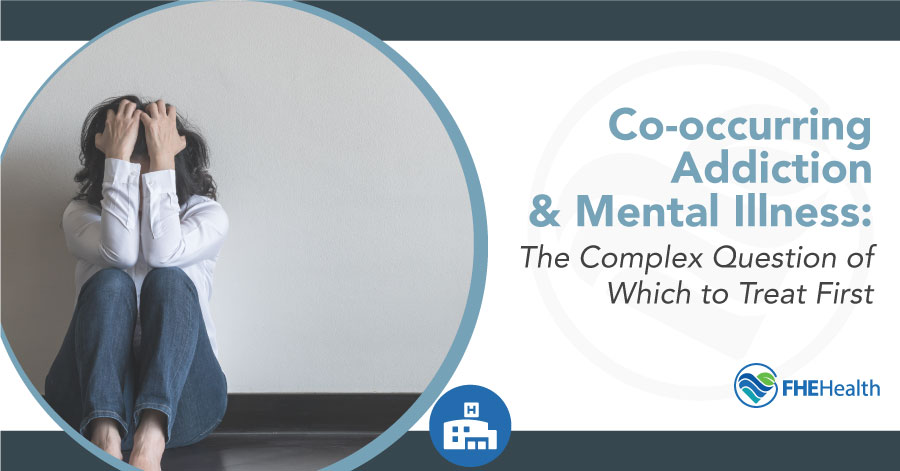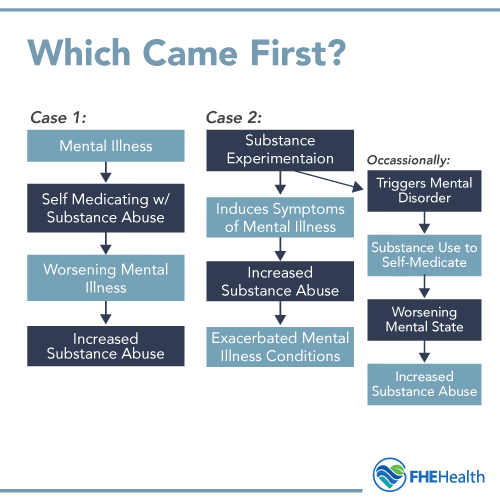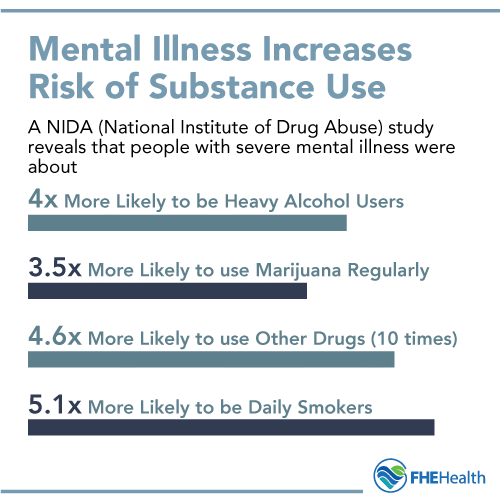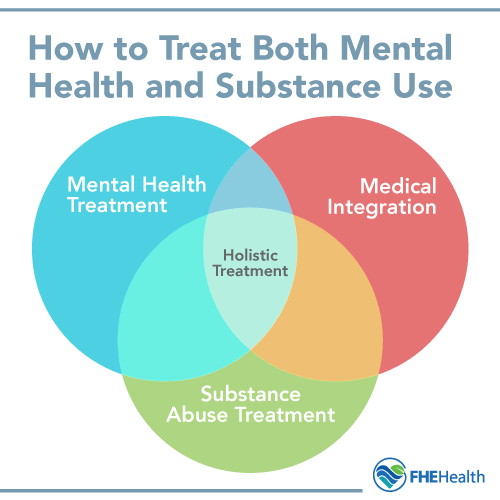
Mental illness and addiction are often linked, meaning a person who may have a substance abuse problem could also suffer from depression or anxiety. When mental health and substance abuse are evident, it’s called dual diagnosis. Such patients will need an integrated approach to treatment. It’s not possible to manage just the underlying mental health problem, nor is it beneficial to treat just the drug or alcohol addiction.
Which Came First?
 In a classic chicken or egg situation, it’s not always possible to know whether a person developed a mental health disorder or substance abuse first. It’s not uncommon for a condition such as PTSD to lead to the onset of alcoholism. On the other hand, drug use can create a depression in some as well. The doctor’s goal is always to treat the whole person. Often that means gathering insight into those underlying causes when possible.
In a classic chicken or egg situation, it’s not always possible to know whether a person developed a mental health disorder or substance abuse first. It’s not uncommon for a condition such as PTSD to lead to the onset of alcoholism. On the other hand, drug use can create a depression in some as well. The doctor’s goal is always to treat the whole person. Often that means gathering insight into those underlying causes when possible.
When a person is ready to commit to residential treatment for any need, it’s very likely that their medical and psychological issues are intertwined. It’s difficult to separate them to deal with them individually.
Doctors will ask questions to learn as much as possible about a patient to determine the cause. For example, did hallucinogenics cause a psychotic break? If so, this could have been the cause of schizophrenia becoming evident. Could a person with a substance abuse problem be treating their symptoms of bipolar disorder with the numbing effects of a drink?
Medical Needs Are Met First
Some medical conditions need treatment as a primary step. For example, if a person has nutritional deficiencies or is facing heart failure as a result of their drug use, the first step is to get the patient to a medically stable position. Treating the medical needs is always necessary through a personalized plan. Once a person is able to remain stable medically, they can begin treatment for mental health and substance use.
The Right Treatment Center Is Key
It’s important for an individual who may have a dual diagnosis to visit a full-fledged drug and alcohol treatment center that also incorporates mental health treatment. This is not common in the U.S. Many locations offer substance abuse treatment but don’t link both mental health and substance abuse in the same treatment program, leaving potential gaps in the care a person needs.
Understanding the Link Between Medical and Psychological Health
 A study conducted by the National Institute on Drug Abuse found that people with a mental illness such as bipolar disorder or schizophrenia are at a higher risk for substance use. Because they lack certain protective factors that help reduce the risk of substance abuse, men and women with these mental health disorders are more likely to reach for cigarettes, drugs or alcohol to treat their symptoms than those without mental health disorders.
A study conducted by the National Institute on Drug Abuse found that people with a mental illness such as bipolar disorder or schizophrenia are at a higher risk for substance use. Because they lack certain protective factors that help reduce the risk of substance abuse, men and women with these mental health disorders are more likely to reach for cigarettes, drugs or alcohol to treat their symptoms than those without mental health disorders.
The study found that people who have a severe mental illness are four times more likely to use alcohol (drink four or more drinks a day) and 3.5 times more likely to use drugs like marijuana on a regular basis.
Why does this occur? According to the study, the use of substances disrupts the same brain circuits that are impacted by mental health disorders. As a result, they are more prone to develop a dependency.
Which Gets Treated First, Then?
In a co-occurring disorder situation, doctors and psychologists must determine what the most pressing problem is at that moment. For example, when a patient arrives in a mental health facility for inpatient care or detox, a full examination and evaluation are performed. The doctor will first address any life-threatening condition, such as the risk of overdose or toxicity. In some patients, the largest worry is psychosis, in which case that is stabilized prior to any additional treatment.
Once a person is stable, both medically and emotionally, the work to treat the condition can begin. The goal is to improve the patient’s health as holistically as possible. Many patients will require pain medications or full detox to rid the body of the chemicals themselves. Yet it becomes even more important to treat the patient’s health naturally, such as providing an improved diet and creating safe surroundings.
Unraveling the Causes of Dependency
For a spouse or parent, it may seem easy to pinpoint the cause of dependency. It could have been “the wrong crowd of friends” or just a one-time use that led to the overdose. Yet, most commonly, there are some factors behind this that pushed the individual towards using. It very well could be an accident or peer pressure, but more than likely it was due to an underlying mental health disorder or stressful situation.
During rehabilitation, then, the goal is to unravel a person’s life enough to understand this. When a dual diagnosis is likely the situation, doctors will work to pinpoint any traumatic events, family history of mental health disorder or even a genetic cause. It’s important to remember either the mental illness or the substance abuse may have occurred first. Yet many people have a predisposition to mental health disorders that can be triggered through social drinking or tobacco use. Learning this can help you and your doctors to create an effective treatment.
Improving Outcomes with Personalized Treatment
Addiction and mental health treatment will always examine the “why” whenever possible. The most effective treatment is one that uncovers and treats the underlying cause. In some situations, this can include using appropriate medications, when needed, to stabilize the underlying mental health disorder. Treating the substance dependency is always part of the treatment plan, but addressing the drug use first isn’t always going to be the most effective route, if it is a symptom of the mental health issue.
For others, dependency is a chemical reaction in the brain. In some cases, a person’s depression and anxiety are due to their use of the drug. If that were the case, detox and proper substance abuse rehabilitation focusing on cognitive therapy may be ideal.
In most situations, doctors have the single goal of helping a patient to recover the best they can in the situation they are facing. This may mean long-term rehabilitation for both mental health and substance abuse. With customized treatments and therapies, doctors can help most people to live fuller lives.
What You Can Expect from Dual-Diagnosis Treatment
 Treating dual diagnosis begins with understanding the person. That’s why most patients who arrive at a treatment center will work through the following process:
Treating dual diagnosis begins with understanding the person. That’s why most patients who arrive at a treatment center will work through the following process:
- If the chemical dependency is severe, most patients will need to go through detox. This removes the chemical and toxins from the body.
- If a person is in a state of unstable mental health, that individual may need medications to stabilize them. Inpatient therapy is the starting point here.
- The patient meets with their therapist to start the evaluation portion after this.
- Group sessions, individual therapy and other types of counseling begin.
- Holistic care of the person’s physical needs are met, such as improving their nutritional intake, getting exercise and providing a safe place.
- Doctors may need to work through one or more medication treatments to find the right combination to stabilize any type of mental health disorder, as needed. When possible, holistic treatment is provided rather than medication.
- The patient’s long-term goals are established for both inpatient and outpatient care.
All patients need to be stabilized to protect their health. Then, the right treatment is given to support their long-term recovery.






